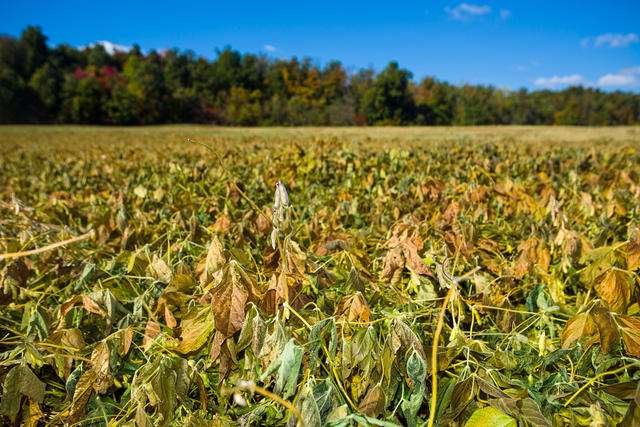Arctic high-pressure system settles into Kentucky
Arctic high-pressure system settles into Kentucky

High pressure out of the Arctic followed a weeklong series of cold fronts into the state last night, bringing with it fall’s first freeze. Clearing skies and calm winds provided the perfect environment for temperatures to plummet into the 20s in many parts of the state—the lowest temperatures seen yet this season.
“While this is typically the time of the year that Kentucky experiences its first freeze, a hard freeze of 28 degrees is normally not seen until early November,” said Matt Dixon, University of Kentucky agricultural meteorologist in the College of Agriculture, Food and Environment.
Meteorologists at the UKAg Weather Center said the cold trend would continue through today and into Saturday morning, when they anticipate another freeze event to occur. Unlike Thursday night, when parts of Central Kentucky dropped to the low 20s, tonight’s coldest temperatures will be centered over eastern portions of the state. Most other areas of the state will be below freezing tonight, but temperatures will not be as extreme as last night’s were.
This will end the 2013 growing season. Vine crops such as summer and winter squashes, cucumbers and pumpkins, as well as solanaceous crops like tomatoes, eggplants and peppers will be hit hard by the freeze, said John Strang, UK extension professor and fruit and vegetable specialist. Cole crops, such as broccoli, cauliflower, Brussels sprouts, cabbage, kale, kohlrabi and turnips will ride out the low temperatures just fine.
“As far as sweet potatoes go, either dig them up or cover them. If the ends of sweet potato roots are frozen at the soil surface they won’t heal; they’ll rot,” Strang said.
At around 26 degrees, apples will freeze. It’s best not to harvest them immediately. Instead, harvest them after they thaw. They won’t keep as long, but are otherwise fine. Sweeter apples will weather these temperatures better than late-maturing varieties that haven’t developed their sweetness yet.
“The sugar in apples acts kind of like antifreeze in your car,” Strang said.
The early freeze will not have much affect on grain crops, said Chad Lee, UK extension grain crops specialist.
“Corn is done. There is maybe a field or two of corn for silage and a few acres of double-crop soybeans that will get killed off from this frost, but we’re talking a very small amount,” he said. “If I had to put a number to it, I would say less than 2 percent of the double-crop soybeans are in that category.”
Lee said the frost would help wheat that’s been planted, because it would kill off some of the insects that would otherwise damage the crop.
For home gardeners, Strang recommended bringing potted plants inside or covering sensitive outdoor plants. It is best to cover them with a heavy blanket or something that will provide insulation, rather than plastic, as plastic tends not to trap the heat from the ground, and plants become much colder.
A bit of a break will be felt next week. Breezy, southwesterly air will begin flowing into the state on Saturday, which will mark a warming trend across the Ohio Valley. Dixon said high temperatures will be back in the 60s early next workweek.
Weather


